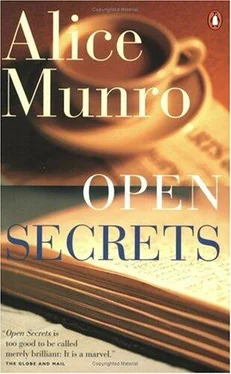Alice Munro - Open Secrets
Здесь есть возможность читать онлайн «Alice Munro - Open Secrets» весь текст электронной книги совершенно бесплатно (целиком полную версию без сокращений). В некоторых случаях можно слушать аудио, скачать через торрент в формате fb2 и присутствует краткое содержание. Год выпуска: 1994, ISBN: 1994, Издательство: McClelland & Stewart, Жанр: Проза, на английском языке. Описание произведения, (предисловие) а так же отзывы посетителей доступны на портале библиотеки ЛибКат.
- Название:Open Secrets
- Автор:
- Издательство:McClelland & Stewart
- Жанр:
- Год:1994
- ISBN:978-1-55199-396-6
- Рейтинг книги:5 / 5. Голосов: 1
-
Избранное:Добавить в избранное
- Отзывы:
-
Ваша оценка:
- 100
- 1
- 2
- 3
- 4
- 5
Open Secrets: краткое содержание, описание и аннотация
Предлагаем к чтению аннотацию, описание, краткое содержание или предисловие (зависит от того, что написал сам автор книги «Open Secrets»). Если вы не нашли необходимую информацию о книге — напишите в комментариях, мы постараемся отыскать её.
Open Secrets — читать онлайн бесплатно полную книгу (весь текст) целиком
Ниже представлен текст книги, разбитый по страницам. Система сохранения места последней прочитанной страницы, позволяет с удобством читать онлайн бесплатно книгу «Open Secrets», без необходимости каждый раз заново искать на чём Вы остановились. Поставьте закладку, и сможете в любой момент перейти на страницу, на которой закончили чтение.
Интервал:
Закладка:
The house was not sold or rented. It was not torn down, either, and its construction was so sound that it did not readily give way. It was capable of standing for years and years and presenting a plausible appearance. A tree of cracks can branch out among the bricks, but the wall does not fall down. Window sashes settle at an angle, but the window does not fall out. The doors were locked, but it was probable that children got in, to write things on the walls and break up the crockery that Dorrie had left behind. Millicent never went in to see.
There was a thing that Dorrie and Albert used to do, and then Dorrie did alone. It must have started when they were children. Every year, in the fall, they — and then, she — collected up all the walnuts that had fallen off the trees. They kept going, collecting fewer and fewer walnuts, until they were reasonably sure that they had got the last, or the next-to-last, one. Then they counted them, and they wrote the final total on the cellar wall. The date, the year, the total. The walnuts were not used for anything once they were collected. They were just dumped along the edge of the field and allowed to rot.
Millicent did not continue this useless chore. She had plenty of other chores to do, and plenty for her children to do. But at the time of year when the walnuts would be lying in the long grass, she would think of that custom, and how Dorrie must have expected to keep it up until she died. A life of customs, of seasons. The walnuts drop, the muskrats swim in the creek. Dorrie must have believed that she was meant to live so, in her reasonable eccentricity, her manageable loneliness. Probably she would have got another dog.
But I would not allow that, thinks Millicent. She would not allow it, and surely she was right. She has lived to be an old lady, she is living yet, though Porter has been dead for decades. She doesn’t often notice the house. It is just there. But once in a while she does see its cracked face and the blank, slanted windows. The walnut trees behind, losing again, again, their delicate canopy of leaves.
I ought to knock that down and sell the bricks, she says, and seems puzzled that she has not already done so.
The Albanian Virgin
In the mountains, in Maltsia e madhe, she must have tried to tell them her name, and “Lottar” was what they made of it. She had a wound in her leg, from a fall on sharp rocks when her guide was shot. She had a fever. How long it took them to carry her through the mountains, bound up in a rug and strapped to a horse’s back, she had no idea. They gave her water to drink now and then, and sometimes raki , which was a kind of brandy, very strong. She could smell pines. At one time they were on a boat and she woke up and saw the stars, brightening and fading and changing places — unstable clusters that made her sick. Later she understood that they must have been on the lake. Lake Scutari, or Sckhoder, or Skodra. They pulled up among the reeds. The rug was full of vermin, which got under the rag tied around her leg.
At the end of her journey, though she did not know it was the end, she was lying in a small stone hut that was an outbuilding of the big house, called the kula . It was the hut of the sick and dying. Not of giving birth, which these women did in the cornfields, or beside the path when they were carrying a load to market.
She was lying, perhaps for weeks, on a heaped-up bed of ferns. It was comfortable, and had the advantage of being easily changed when fouled or bloodied. The old woman named Tima looked after her. She plugged up the wound with a paste made of beeswax and olive oil and pine resin. Several times a day the dressing was removed, the wound washed out with raki . Lottar could see black lace curtains hanging from the rafters, and she thought she was in her room at home, with her mother (who was dead) looking after her. “Why have you hung up those curtains?” she said. “They look horrible.”
She was really seeing cobwebs, all thick and furry with smoke — ancient cobwebs, never disturbed from year to year.
Also, in her delirium, she had the sensation of some wide board being pushed against her face — something like a coffin plank. But when she came to her senses she learned that it was nothing but a crucifix, a wooden crucifix that a man was trying to get her to kiss. The man was a priest, a Franciscan. He was a tall, fierce-looking man with black eyebrows and mustache and a rank smell, and he carried, besides the crucifix, a gun that she learned later was a Browning revolver. He knew by the look of her that she was a giaour — not a Muslim — but he did not understand that she might be a heretic. He knew a little English but pronounced it in a way that she could not make out. And she did not then know any of the language of the Ghegs. But after her fever subsided, when he tried a few words of Italian on her, they were able to talk, because she had learned Italian at school and had been travelling for six months in Italy. He understood so much more than anyone else around her that she expected him, at first, to understand everything. What is the nearest city? she asked him, and he said, Skodra. So go there, please, she said — go and find the British Consulate, if there is one. I belong to the British Empire. Tell them I am here. Or if there is no British Consul, go to the police.
She did not understand that under no circumstances would anybody go to the police. She didn’t know that she belonged now to this tribe, this kula , even though taking her prisoner had not been their intention and was an embarrassing mistake.
It is shameful beyond belief to attack a woman. When they had shot and killed her guide, they had thought that she would turn her horse around and fly back down the mountain road, back to Bar. But her horse took fright at the shot and stumbled among the boulders and she fell, and her leg was injured. Then they had no choice but to carry her with them, back across the border between the Crna Gora (which means Black Rock, or Montenegro) and Maltsia e madhe.
“But why rob the guide and not me?” she said, naturally thinking robbery to be the motive. She thought of how starved they looked, the man and his horse, and of the fluttering white rags of his headdress.
“Oh, they are not robbers!” said the Franciscan, shocked. “They are honest men. They shot him because they were in blood with him. With his house. It is their law.”
He told her that the man who had been shot, her guide, had killed a man of this kula . He had done that because the man he had killed had killed a man of his kula . This would go on, it had been going on for a long time now, there were always more sons being born. They think they have more sons than other people in the world, and it is to serve this necessity.
“Well, it is terrible,” the Franciscan concluded. “But it is for their honor, the honor of their family. They are always ready to die for their honor.”
She said that her guide did not seem to be so ready, if he had fled to Crna Gora.
“But it did not make any difference, did it?” said the Franciscan. “Even if he had gone to America, it would not have made any difference.”
At Trieste she had boarded a steamer, to travel down the Dalmatian Coast. She was with her friends Mr. and Mrs. Cozzens, whom she had met in Italy, and their friend Dr. Lamb, who had joined them from England. They put in at the little port of Bar, which the Italians call Antivari, and stayed the night at the European Hotel. After dinner they walked on the terrace, but Mrs. Cozzens was afraid of a chill, so they went indoors and played cards. There was rain in the night. She woke up and listened to the rain and was full of disappointment, which gave rise to a loathing for these middle-aged people, particularly for Dr. Lamb, whom she believed the Cozzenses had summoned from England to meet her. They probably thought she was rich. A transatlantic heiress whose accent they could almost forgive. These people ate too much and then they had to take pills. And they worried about being in strange places — what had they come for? In the morning she would have to get back on the boat with them or they would make a fuss. She would never take the road over the mountains to Cetinge, Montenegro’s capital city — they had been told that it was not wise. She would never see the bell tower where the heads of Turks used to hang, or the plane tree under which the Poet-Prince held audience with the people. She could not get back to sleep, so she decided to go downstairs with the first light, and, even if it was still raining, to go a little way up the road behind the town, just to see the ruins that she knew were there, among the olive trees, and the Austrian fortress on its rock and the dark face of Mount Lovchen.
Читать дальшеИнтервал:
Закладка:
Похожие книги на «Open Secrets»
Представляем Вашему вниманию похожие книги на «Open Secrets» списком для выбора. Мы отобрали схожую по названию и смыслу литературу в надежде предоставить читателям больше вариантов отыскать новые, интересные, ещё непрочитанные произведения.
Обсуждение, отзывы о книге «Open Secrets» и просто собственные мнения читателей. Оставьте ваши комментарии, напишите, что Вы думаете о произведении, его смысле или главных героях. Укажите что конкретно понравилось, а что нет, и почему Вы так считаете.












